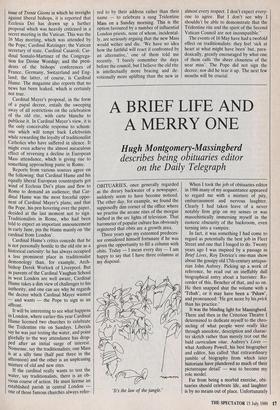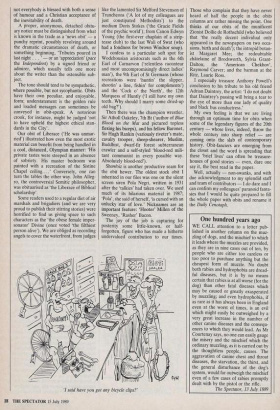A BRIEF LIFE AND A MERRY ONE
Hugh Montgomery-Massingberd describes being obituaries editor on the Daily Telegraph
OBITUARIES, once generally regarded as the dreary backwater of a newspaper, suddenly seem to have become noticed. The other day, for example, we found the supposedly dim corner of the office where we practise the arcane rites of the morgue bathed in the arc lights of television. That barometer of popular culture has obviously registered that obits are a growth area. Three years ago my esteemed predeces- sor considered himself fortunate if he was given the opportunity to fill a column with obits. Today — I mean every day — I am happy to say that I have three columns at my disposal.
`It's the law of the jungle.' When I took the job of obituaries editor in 1986 many of my acquaintance appeared to regard me with a mixture of pity, embarrassment and nervous laughter. Clearly I had taken leave of a never notably firm grip on my senses or was masochistically immersing myself in the esoteric obscurity of the backroom, even turning into a vampire.
In fact, it was something I had come to regard as potentially the best job in Fleet Street and one that I longed to do. Twenty years ago I was inspired by a passage in Brief Lives, Roy Dotrice's one-man show about the gossipy old 17th-century antiqua- rian John Aubrey. Picking up a work of reference, he read out an ineffably dull biographical entry about a barrister. Re- corder of this, Bencher of that, and so on. He then snapped shut the volume with a 'rehab', or it may have been a `Pshaw', and pronounced: 'He got more by his prick than his practice.'
It was the blinding light for Massingberd. There and then in the Criterion Theatre I determined to dedicate myself to the chro- nicling of what people were really like through anecdote, description and charac- ter sketch rather than merely trot out the bald curriculum vitae. Aubrey's Lives — what Anthony Powell, his best biographer and editor, has called 'that extraordinary jumble of biography from which later historians have plundered so much of their picturesque detail' — was to become my role model.
Far from being a morbid exercise, obi- tuaries should celebrate life, and laughter is by no means out of place. Unfortunately not everybody is blessed with both a sense' of humour and a Christian acceptance of the inevitability of death.
A proper, anonymous, detached obitu- ary notice must be distinguished from what is known in the trade as a 'news obit' — a punchy reprint, possibly revolving around the dramatic circumstances of death, or something beginning, 'Tributes poured in last night . . . ' — or an 'appreciation' (pace the Independent) by a signed friend or admirer, which usually tells one more about the writer than the ostensible sub- ject.
The tone should tend to be sympathetic, where possible, but not sycophantic. Obits. have their own peculiar, and enjoyable, form; understatement is the golden rule and loaded messages can sometimes be conveyed in obit-speak. A notorious crook, for instance, might be judged 'not to have upheld the highest ethical stan- dards in the City'.
Our obit of Liberace (`He was unmar- ried') illustrated how even the most exotic material can benefit from being handled in a cool, distanced, Olympian manner: 'His private tastes were steeped in an absence of sobriety. His master bedroom was painted with a recreation of the Sistine Chapel ceiling....' Conversely, one can turn the tables the other way. John Alleg- ro, the controversial Semitic philosopher, was obituarised as 'the Liberace of Biblical scholarship'.
Some readers used to a regular diet of air marshals and brigadiers (and we are very proud to publish their stirring stories) were horrified to find us giving space to such characters as the 'the obese female imper- sonator' Divine (once voted 'the filthiest person alive'). We are obliged as recording angels to cover the waterfront, from judges like the lamented Sir Melford Stevenson of Truncheons CA lot of my colleagues are just constipated Methodists') to the medium Doris Stokes (`the Gracie Fields of the psychic world'); from Canon Edwyn Young (the first-ever chaplain of a strip- tease club) to the last Wali of Swat (who had a fondness for brown Windsor soup).
I confess to a particular soft spot for Wodehousian aristocrats such as the 6th Earl of Carnarvon (`relentless raconteur and most uncompromisingly direct ladies' man'), the 9th Earl of St Germans (whose recreations were 'huntin' the slipper, shootin' a line, fishin' for compliments') and the 'Cock o' the North', the 12th Marquess of Huntly CI still have my own teeth. Why should I marry some dried-up old bag?').
Then there was the champion wrestler, Sir Atholl Oakeley, 7th Bt (`author of Blue Blood on the Mat and pictured topless flexing his biceps), and his fellow Baronet, Sir Hugh Rankin (variously riveter's mate, cavalry trooper, sheep-shearer, Muslim, Buddhist, dwarf-fir forest subterranean crawler and a self-styled `blood-red mili- tant communist in every possible way. Absolutely blood-red').
Showbiz is another productive seam for the obit hewer. The oldest stock obit I inherited in our files was one on the silent screen siren Pola Negri, written in 1931 after the 'talkies' had taken over. We used much of its hilarious material in 1987; Tola', she said of herself, 'is cursed with an unlucky star of love.' Nicknames are an important feature: 'Hooter' Millen of the Sweeney, 'Rasher' Bacon.
The joy of the job is capturing for posterity some little-known, or half- forgotten, figure who has made a hitherto undervalued contribution to our times. Those who complain that they have never heard of half the people in the obits columns are rather missing the point. One thinks of our obits of the munificent Zionist Dollie de Rothschild (who believed that 'the really decent individual only appeared in the newspapers on two occa- sions, birth and death'); the intrepid botan- ist Margaret Mee; the redoubtable chatelaine of Brodsworth, Sylvia Grant- Dalton; the 'American Chekhov', Raymond Carver; and the barman at the Ritz, Laurie Ross.
I especially treasure Anthony Powell's conclusion to his tribute to his old friend Adrian Daintrey, the artist: 'I do not doubt that Daintrey's passing will bring a tear to the eye of more than one lady of quality and black bus conductress.'
My own feeling is that we are living through an optimum time for obits when some of the legendary figures of the 20th century — whose lives, indeed, throw the whole century into sharp relief — are coming onto the slab of contemporary history. Obit-fanciers are emerging from the closet and the word is spreading that these 'brief lives' can often be treasure- houses of good stories — even, dare one say it, the best read in the paper.
Well, actually — non-swanks, and with due acknowledgment to my splendid staff and team of contributors — I do dare and I can confirm my colleagues' paranoid fanta- sies that I would be quite prepared to fill the whole paper with obits and rename it the Daily Cenotaph.



















































 Previous page
Previous page